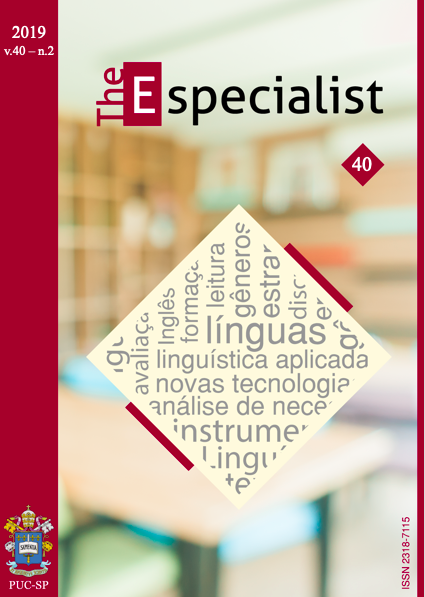Institutional internationalisation through academic literacies in English: teaching and learning written genres in the Brazilian higher education context
DOI:
https://doi.org/10.23925/2318-7115.2019v40i2a5Keywords:
Internationalisation, Brazilian higher education context, Academic literacies, Written genres.Abstract
This contribution delves into the process of internationalisation of Brazilian higher education institutions by focusing on academic literacies in English. We highlight initiatives carried out at the Federal University of Minas Gerais in Brazil as to the teaching and learning of an array of written genres. We also assess its impact on graduate and undergraduate students’ insertion in the various international academic/scientific communities. Drawing on references within the realm of English for Academic Purposes and Academic Literacies, this work also addresses course design and application of activities concerning academic writing. Students’ personal accounts regarding their own experiences in producing written material have also been presented and discussed against the backdrop of an institutional internationalisation scenario. We concluded that the teaching and learning of written academic genres across various domains of knowledge does enhance the university’s internationalisation process both at its “at home” and “abroad” strands.
References
BADGER, R.; WHITE, G. 2000. Product, process and genre: approaches to writing in EAP. ELT Journal, 54.2: 153-160.
BAKHTIN, M; VOLOSHINOV. 2003. Os gêneros do discurso [1952-53]. Estética da Criação Verbal. São Paulo: Martins Fontes.
BENESCH, S. 2001. Critical English for Academic Purposes. Mahwah, NJ: Erlbaum.
CELANI, M. A. A. 2005. Introduction. In: CELANI, M.A.A., DEYES, A., HOLMES, J.; SCOTT, M. (Orgs.), 2005, ESP in Brazil: 25 Years of Evolution and Reflection. São Paulo: EDUC e Mercado das Letras. pp.13-26.
CHAZAL, E. 2014. English for academic purposes. UK: Oxford Press.
DUDLEY-EVANS, T., ST JOHN, M.-J. 1998. Developments in English for Specific Purposes. Cambridge: Cambridge University Press.
DUTRA, D.; QUEIROZ, J.; ALVES, J. 2017. Adding information in argumentative texts: a learner corpus-based study of additive linking adverbials. Revista Estudos Anglo-Americanos, 46.1: 9-32.
FLOWERDEW, J.; PEACOCK, M. 2001. Issues in EAP: A preliminary perspective. In FLOWERDEW, J.; PEACOCK, M. (Eds.), 2001, Research perspectives on English for academic purposes. Cambridge and New York: Cambridge University Press. pp. 8-24
GUEDES, A. S. 2017. Verbos do inglês acadêmico escrito e suas colocações: um estudo baseado em um corpus de aprendizes brasileiros de inglês. 199 f. Tese (Doutorado em Linguística Aplicada ao Ensino/Aprendizagem de Línguas Estrangeiras) - Faculdade de Letras, Universidade Federal de Minas Gerais, Belo Horizonte.
HUDZIK, J. 2011. Comprehensive internationalization: From concept to action. Washington: NAFSA.
HYLAND, K. 2004. Disciplinary discourses, Michigan classics ed.: Social interactions in academic writing. University of Michigan Press.
____________. 2006. English for academic purposes: an advanced resource book. London: Routledge
____________. 2007. Genre pedagogy: Language, literacy and L2 writing instruction. Journal of Second Language Writing, 16.3: 148-164.
JENKINS, S.; JORDAN, M. K.; WEILAND, P. 1993. The role of writing in graduate engineering education: a survey of faculty beliefs and practices. English for Specific Purposes, 12: 51–67.
KNIGHT, J. 2003b. Updating the definition of internationalization. International Higher Education, 33: 2-3.
__________. 2004. Internationalization remodeled: Definition, approaches, and rationales. Journal of Studies in International Education, 8(1), 5–31.
_________. 2006. Internationalization of higher education: new directions, new challenges. Paris: IAU.
_________. 2008. Higher Education in Turmoil: The Changing World of Internationalization. Sense Pub: The Netherlands.
KRESS, G. R. 2003. Literacy in the new Media Age. London: Routledge Falmer.
LEA, M. R.; STREET, B.V. 1998. Student writing in higher education: an academic literacies approach. Studies in Higher Education, 23.2: 157-172.
MEURER, J. L. 2004. Questões de gênero e discurso na contemporaneidade. Notas realizadas durante plenária proferida em 11 de outubro de 2004, no VII Congresso Brasileiro de Lingüística Aplicada, ocorrido na PUC-SP.
MOTTA-ROTH, D. A. 1999. A importância do conceito de Gêneros discursivos no ensino de redação acadêmica. Intercâmbio, 8: 119-28.
________________.; HENDGES, G. H. 2010. Produção textual na universidade. São Paulo: Parábola Editorial.
RAMOS, R.C.G. 2004. Gêneros textuais: uma proposta de aplicação em cursos de inglês para fins específicos. The ESPecialist, 25.2: 107-129. São Paulo
_______________. 2009. ESP in Brazil: History, new trends and challenges. In: Krzanovwski, M. (Ed), 2009, Current developments in English for academic and specific purposes in developing,emerging and least-developed countries. Garnet Publishing Ltd. pp. 63-80.
_______________. 2017. Gênero, IFA e design de cursos: relato de uma experiência. DELTA, 33.3: 787- 810.
STREET, B. 1984. V. Literacy in theory and practice. Cambridge: Cambridge University Press.
_________.1993. Cross-cultural approaches to literacy. Cambridge: Cambridge University Press.
_________.1995. V. Social literacies: critical approaches to literacy in development, ethnography and education. New York: Longman.
_________. 2009. “Hidden” Features of Academic Paper Writing. Working Papers in Educational Linguistics, UPenn.
________. 2010. Academic Literacies approaches to Genre? Revista Brasileira de Linguística Aplicada, 10.2: 347-361.
SWALES, J. M. 1990. Genre analysis: English in academic and research settings. Cambridge: Cambridge.
____________.; FEAK, C. B. 2009. Abstracts and the writing of abstracts. Michigan: the University of Michigan Press.
__________________________. 2012. Academic Writing for Graduate Students: Essential Tasks and Skills. Michigan: The University of Michigan Press. 3rd. ed.
WARD, L. 2004. High hopes for foreign students. The Guardian, April.
Downloads
Published
How to Cite
Issue
Section
License
The authors grant the journal all copyrights relating to the published works. The concepts issued in signed articles are the absolute and exclusive responsibility of their authors.


 Esta obra está licenciada com uma Licença
Esta obra está licenciada com uma Licença 